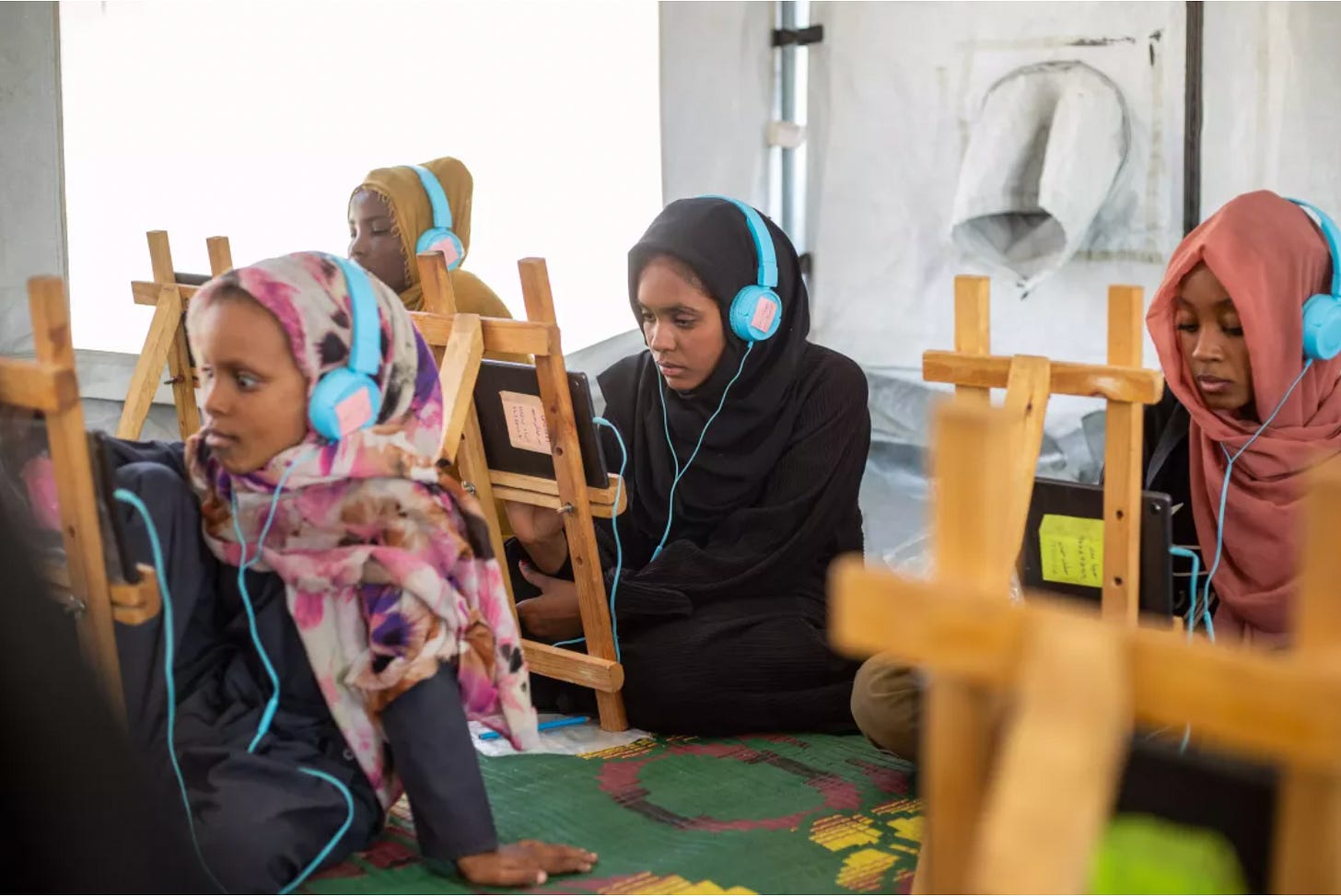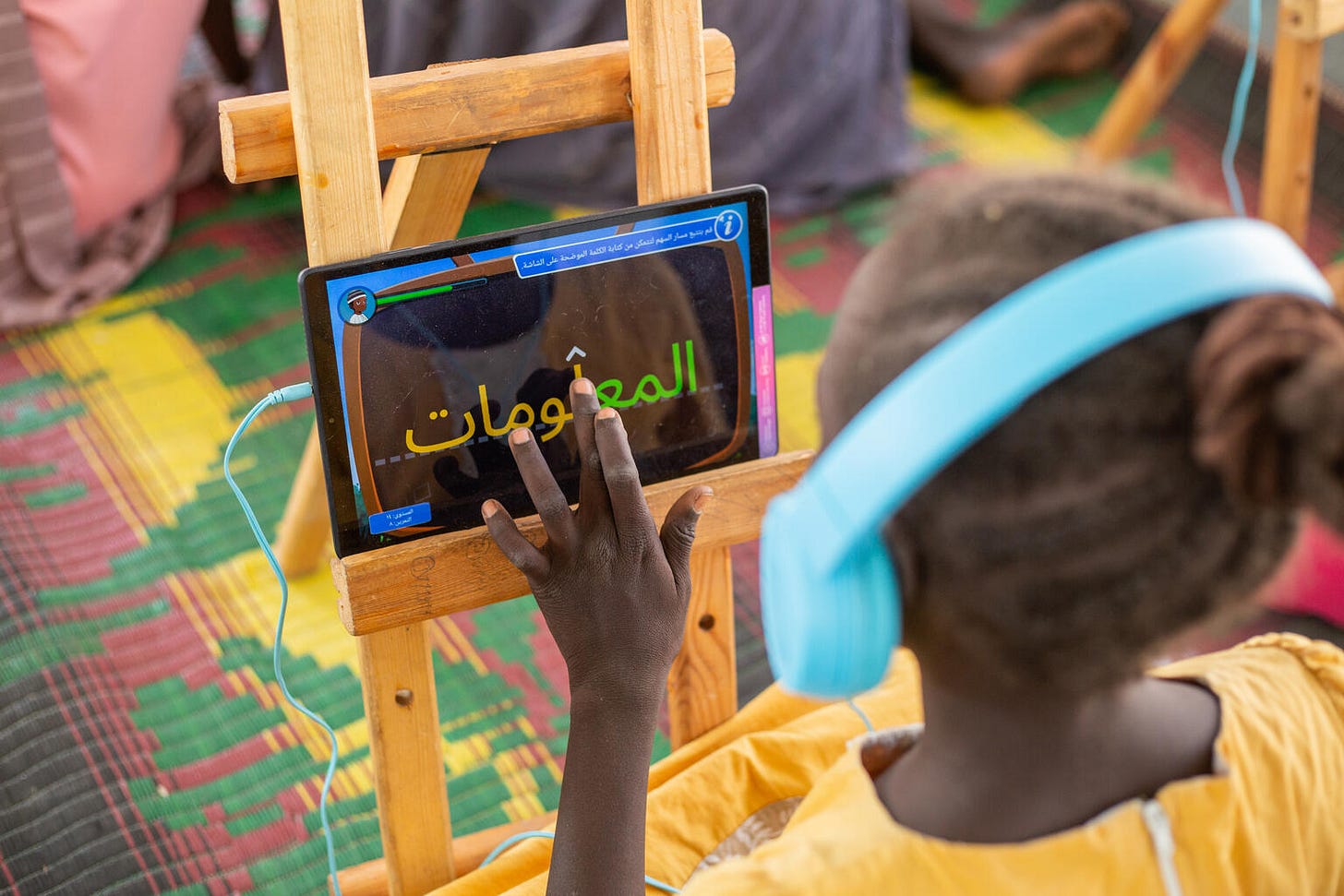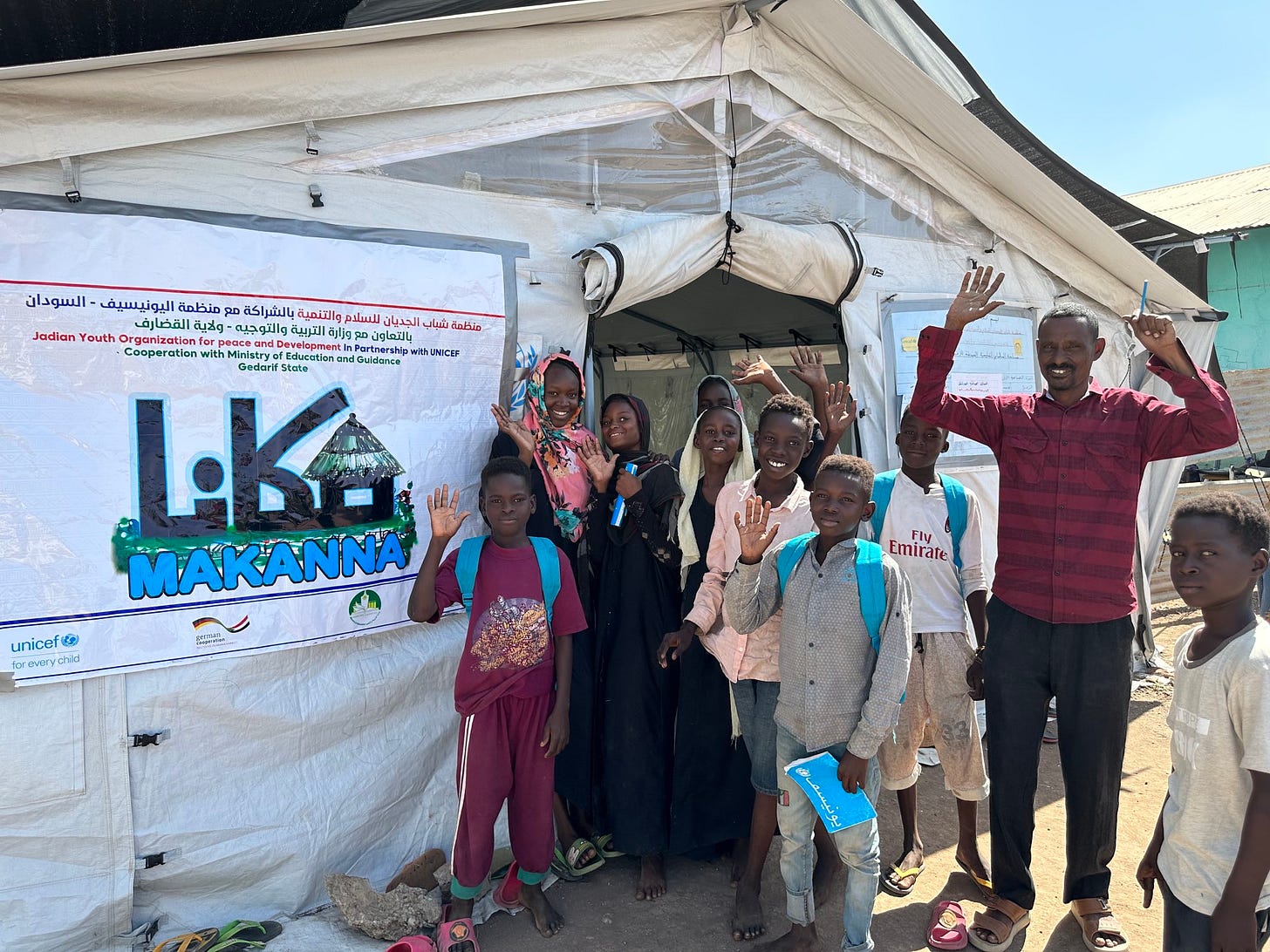Makeshift solutions for out-of-school Sudanese children
Vast learning loss due to Covid-19 pandemic and now a long war
Contents of this article:
Learning hubs for war-displaced Sudanese children
West Darfur survivors exploited for slave labour
Updates on the tensions in N’djamena, Chad
RSF leader Dagalo visits Libya
Other news in brief
Women in Sudan historically have played leading roles as doctors, journalists, educators, and, more recently, as protest leaders during the uprising that toppled the long-time dictator Omar al-Bashir, four years before the current civil war.
Now, however, a new war threatens to plunge the current generation of girls into obscurity, keeping them out of school for years. Millions of girls have fled their homes and are now living in difficult conditions, facing health and safety risks of all kinds, while boys face the additional risk of being recruited into armed groups. Mass recruitment of older boys is commonplace in some regions of the country.
After nearly a year of war, there are few signs that the collapsed education system will revive any time soon. About 19 million Sudanese children are out of school, according to a UNICEF estimate. About a third of the children are from areas directly affected by violence, while others are unable to attend school because authorities shut the schools, in some cases to make room for war-displaced people using them as shelters. Throughout Sudan, teachers have not been paid for much of the war.
These disruptions follow the Covid-19 pandemic, which caused extended school closures, as well as a period of political instability, protests, and teachers’ strikes.
In this context, grassroots Sudanese initiatives and international humanitarian organizations have stepped up to provide temporary solutions that mitigate the disaster—though they don’t fully replicate an established school environment.
UNICEF, the UN Children’s Agency, is funding the establishment of “safe spaces,” which it calls makanna, meaning, “our place.” These learning hubs offer e-learning devices, psychosocial support, and indoor and outdoor games.
Nonprofits including Sadagaat, Jasmar, Norwegian Refugee Council, and Education Cannot Wait are among those working to support children affected by the conflict and the collapse of the education system. Funding for such programs, however, must compete with other humanitarian priorities, including malnutrition and food aid, health care, water and sanitation, and support for trauma victims and rape survivors. The United Nations and its humanitarian partners have appealed for $4.1 billion to respond to Sudan’s disaster. The appeal is currently 3.6% funded.
Out of the total committed funds of $96.7 million, $4.8 million is for education. The UN has asked for $131 million to fully fund the emergency education response.
You can learn more about “safe spaces” in Sudan from these UNICEF articles:
“This is my Makanna – my safe space,” Feb. 4, 2024
“Safe learning spaces: A new dawn for children in Sudan,” Nov. 27, 2023
Ardamata survivors used for slave labour
Ayin, an independent publisher and video production house, has published an investigation (in Arabic), accompanied by a video, documenting the exploitation of survivors of the Ardamata massacre for slave labour.
Arab militias, led by the Rapid Support Forces (RSF), attacked and overran the army garrison in Ardamata in November, after which they turned their wrath on the neighboring civilian communities, which were predominantly Masalit. This followed earlier massacres in nearby El Geneina earlier last year. Many men were killed on an ethnic basis, while the women fled to neighboring Chad, sometimes suffering rape or beatings on the way. Male survivors were whipped and forced to work on farms.
The survivors spoke with Ayin at Adré refugee camp after escaping to Chad. One of them, Ibrahim Musa, said he was captured in Ardata along with others. He said,
“They used me to transport their belongings, and then to farm on the outskirts of the city of El Geneina. Then they returned me to Ardamata, and took me to the camp, and I was exposed to racist and verbal violence. After that, one of them took me to work as a servant for his wives and grow beans and corn in large areas.”
Another survivor, Masoud Ahmed Mohammed, was captured by the RSF while trying to cross the Sudanese border into Chad. He was taken with a group of others to the RSF-led Anti-Smuggling Unit in the region, where he found many others who had been captured by the RSF, both civilians and army soldiers. He said,
“We remained detained for forty days, and the treatment was bad, and we were subjected to physical, verbal, and racist violence, and they forced us to work forcibly in officers’ homes, building, collecting firewood, and farming without compensation.”
Masoud escaped to Chad, a journey of ten days on foot. Others were released after their relatives paid a financial ransom of 700-1000 Sudanese pounds.
Another survivor, Muhammad al-Nur Ismail, was threatened with death by RSF soldiers in Ardamata, mistreated, and accused of possessing weapons.
“After this torture, they took me with others to work in agriculture in the morning and evening, until I suffered wounds and bleeding in my hands... After that, they gave me 5,000 pounds, and asked me to leave, and from there I immediately headed to the Sudanese refugee camps in Chad.”
Slavery has a long history in Sudan. Despite its nominal abolition in 1924, forced labour and exploitation continued in various forms over the past century. Previous wars in South Sudan, the Nuba Mountains, Blue Nile, and Darfur provided the excuse and the opportunity to enslave villagers deemed to come from non-Arab ‘blue’ races.
Mohamed Badawi Mohamed, a lawyer and director at the African Center for Peace and Justice Studies, told Ayin he believes the violations are occurring on a wide scale, adding, “These violations occur systematically within the framework of political wars… as happened after the 2003 Darfur war, there were practices similar to forced labour. The April 15 war did not involve a new type of violations. It already existed…”
Updates from N’djamena
Following our update yesterday, authorities confirmed the death of opposition Yaya Dillo. He was killed when security personnel stormed the PSF party headquarters, following an earlier altercation over the death of another PSF official.
Meanwhile, on Friday morning, authorities deployed bulldozers and began demolishing the PSF headquarters. Additionally, they paraded the uncle of the president—another opposition leader—on television, showing him with this hands bound. As explained in our previous newsletter, instability in Chad poses a risk to the humanitarian response for Sudanese refugees in Chad, and inside Darfur.
Dagalo visits Libya
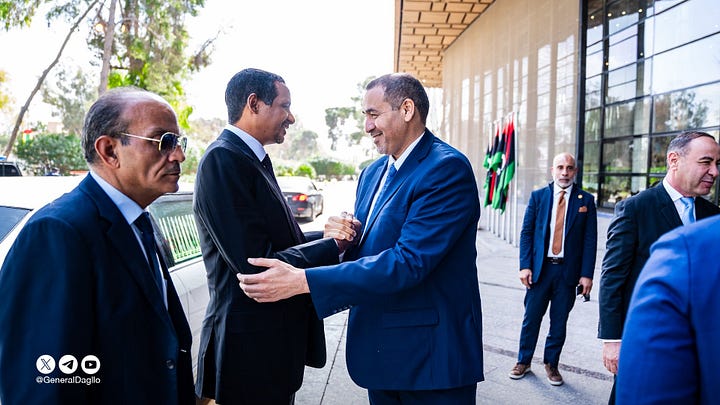
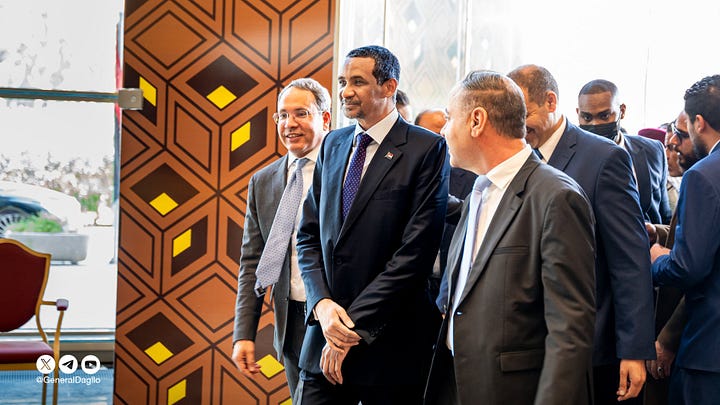
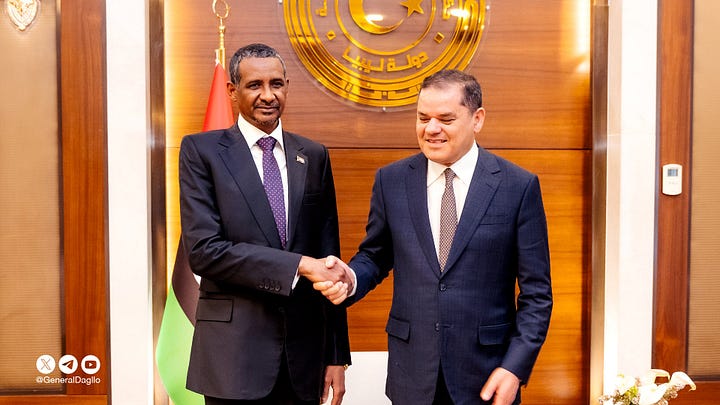
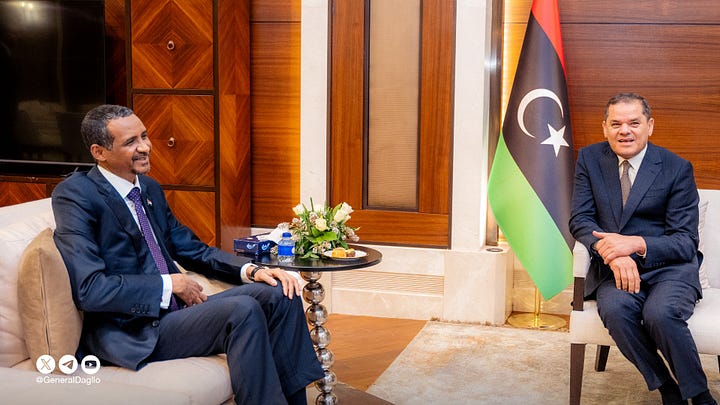
The leader of the Rapid Support Forces, Mohamed Dagalo, visited the Libyan capital Tripoli before yesterday, February 28, where he met Prime Minister Abdul Hamid al-Dabaiba. The visit happened just days after the Tripoli government received Sudan’s military ruler, Abdel Fattah al-Burhan, signaling a relatively even-handed approach by the Libyans. However, Dagalo’s treatment was somewhat different than Al-Burhan’s in protocol terms; he did not receive a red-carpet welcome and did not meet the president. Additionally, his visit did not receive the same attention from Libyan state media. Dagalo’s press team wrote on social media afterwards,
“I had the privilege of meeting yesterday with Prime Minister Abdul Hamid al-Dabaiba, the head of the Government of National Unity in Libya, our neighboring country. Our discussions were productive and insightful… I outlined our vision for ending the hostilities, establishing peace and stability, alleviating the suffering of our people, and laying the foundations for a new and just Sudan… We are deeply grateful to Prime Minister al-Dabaiba for his understanding and support regarding the Sudanese crisis, our stance, and our vision for the future.”
The Libyan initiative is possibly coordinated with Egypt, where SAF Commander-in-Chief Abdel Fattah al-Burhan visited earlier today, his second such visit since August. He met with President Abdel Fattah al-Sisi, who received him warmly.
Independent daily Al-Sharq Al-Awsat interviewed a member of the Egyptian Council for Foreign Affairs about the twin visits. Ambassador Salah Halima said, “Despite the failure of regional initiatives and moves to bring Al-Burhan and Hemedti to the negotiating table, each of them seeks to make a greater impact on the Sudanese scene, whether inside or outside the country.”
“The faltering of the multiple initiatives for various reasons, and the failure of the actions of the Intergovernmental Authority for Development (IGAD)... all push towards the search for alternative paths and dialogue with both sides of the crisis.”
Likewise, an expert on African affairs at the Al-Ahram Center for Political and Strategic Studies, Amani Al-Taweel, said that the Cairo and Tripoli meetings pointed to some “regional interaction, and the entry of Libya, represented by the Dabaiba government, as a new party in order to help reach a settlement, as part of the new Arab endeavor in the Sudanese file.”
News in brief
The anti-war Taqaddum coalition of Sudanese political parties, civil society, and resistance committees held a week of workshops in Nairobi and Kampala to discuss “constitutional arrangements and local government issues after the cessation of the war” and “security and military reform and transitional justice.”
Sudan’s Air Force again bombed Jabrat al-Sheikh in North Kordofan, killing a child and injuring several other members of his family.
The United Nations Integrated Transition Assistance Mission in Sudan (UNITAMS) has completed its withdrawal from the country, following the declaration last year that its leader Volker Perthes was persona non grata.
MSF says “10 unidentified armed men” entered an MSF base in Zalingei, Central Darfur on February 23 and stole two vehicles. “Our team had recently arrived in Zalingei to assess the medical and humanitarian needs of a region significantly impacted by Sudan's ongoing war, with the objective of starting a project soon. This armed incident shocked our colleagues and cannot be tolerated.”
Sudanese attempting to flee the war-affected country face difficult choices, and dangers along the way. This is a video of Sudanese refugees who were detained by the Egyptian military near the Sudan border. The man recording claims they have been held in this warehouse in Abu Simbel for 25 days, giving the date as March 1. He says there are cases of diarrhea, children, and pregnant women. He says he recorded the video to raise awareness about their plight.


